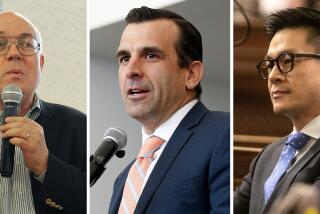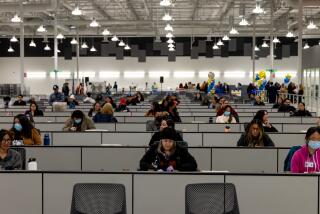Vote Count May Take Longer in Recall Election
- Share via
Much about next Tuesday’s recall election has been odd and unpredictable, but once the ballots are cast, election workers will count them in the same laborious fashion as always.
As in every election, county registrars will release initial results after the polls close and update them through the night. By the wee hours of Oct. 8, most votes cast on election day should have been counted.
Election officials are reluctant to discuss when definitive results will be available, but one expert warned that if the race is close, the outcome may not be immediately clear.
“People should not be surprised if they wake up on the 8th and they don’t know who the new governor is, or even whether the old one has been recalled,” said Loyola University law professor Richard L. Hasen, who specializes in election law. “It all depends on how close it is.”
There are always votes that cannot be counted election night. They include absentee ballots that are turned in at the polls, ballots containing write-in votes, and provisional ballots used when a voter’s registration is questioned or when the voter already has an absentee ballot. These votes require further research and verification. Counties have 28 days to complete the count.
In most races, this behind-the-scenes work does not change the outcome of the election; it’s only when a race is close that attention zooms in on the painstaking count of the last outstanding votes. But some polls show that the election to recall Gov. Gray Davis and to choose a successor could be decided by a narrow margin.
It could be weeks before Secretary of State Kevin Shelley certifies the results, depending on how quickly the 58 counties are able to finalize their tallies.
The recall is a two-part question: whether to remove Davis from office, and, if so, which one of the 135 candidates on the ballot should replace him. It’s possible that someone running to succeed Davis has a large enough lead to claim victory in the candidate runoff even before it is clear whether Davis has been recalled.
Moments after the polls close at 8 p.m., county officials will begin announcing the first returns, typically the absentee ballot counts. They will update their counts throughout the night as precincts report results. But in this election, the counting might be slower in some places that are using new voting equipment.
In San Bernardino County, election officials expect the process to take hours longer than usual. That’s because they bought only enough counting machines to handle this election, intending to later switch to a different system.
The machines will be stationed in San Bernardino, so ballots from Needles -- more than 200 miles away -- must be flown in. Ballots from other far-flung regions like Big River will take three or four hours by car.
“It will be slower and later than what we’ve had in the past,” said registrar Scott Konopasek.
Campaigns and media outlets could declare winners before the night is over by analyzing early tallies and exit polling. In this election, both the Los Angeles Times and Edison Media Research/Mitofsky International plan to conduct exit polling. More than a dozen news organizations, including CNN and the New York Times, have signed up for exit polling data and projections from Edison/Mitofsky, said pollster Warren Mitofsky.
“I have no idea how wide the margins will be,” Mitofsky said. “If it’s a wide margin, we’ll call it immediately. If not, we’ll wait to get more information” from precincts and county registrars.
In Los Angeles County, the state’s largest electoral jurisdiction, officials estimate that up to 200,000 ballots could remain uncounted on Oct. 8.
In every election, the county sends letters to candidates warning them that if they find themselves in a tight race, they might have to wait a few weeks to find out whether they won or lost.
In a statewide election such as the recall, “it’s possible to have up to a million ballots that are uncounted on election night,” said Los Angeles County Registrar-Recorder Conny B. McCormack. “Those votes generally break very much in the same pattern as the other ones did. It would have to be a very close election -- I would think within 1 percentage point -- for it to make a difference. And that’s true of every election.”
California has had plenty of contests so close that the outcome remained uncertain for weeks.
In some races, candidates demand a recount. That was the case in the 1998 battle between then-Los Angeles City Councilman Richard Alarcon and former Assemblyman Richard Katz, who were running for the Democratic nomination for a state Senate seat. Alarcon won by 29 votes.
Katz demanded -- and paid for -- a manual recount, but when the votes started breaking Alarcon’s way, he abandoned the recount.
The recall race is statewide, so it would be very unusual to see such a close margin. But in the 2000 presidential election, George Bush won Florida -- and the presidency -- by a mere 537 votes out of nearly 6 million cast.
More to Read
Get the L.A. Times Politics newsletter
Deeply reported insights into legislation, politics and policy from Sacramento, Washington and beyond. In your inbox twice per week.
You may occasionally receive promotional content from the Los Angeles Times.










